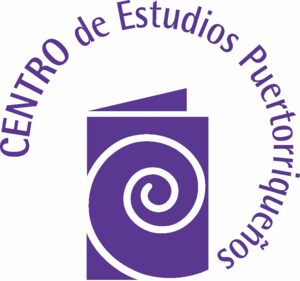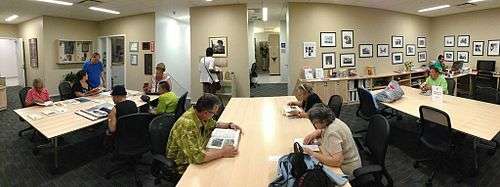Centro de Estudios Puertorriqueños
El Centro, the Center for Puerto Rican Studies or Centro de Estudios Puertorriqueños, is a university-based research institute whose mission is to produce, facilitate, and disseminate interdisciplinary research about the experiences of Puerto Ricans in the U.S. and to collect, preserve, and provide access to archival and library resources documenting the history and culture of Puerto Ricans. To complement these core activities, Centro sponsors a year-round program of educational and cultural activities.

Location
Since 1983, Centro has been housed at 695 Park Avenue, Rm. E1429, New York, NY 10065 at Hunter College, City University of New York (CUNY).
History
Founded in 1973 by a coalition of faculty, students, and community leaders, Centro works closely with a network of education, research, archival, and community-based partners. Centro has been housed at Hunter College since 1983; however, it is a CUNY-wide research center. Centro staff guide and mentor Puerto Rican and other students, assist and advise community organizations and other research institutions and serve on local and national committees concerned with issues of social, economic, educational and cultural policy. In addition, CUNY faculty and staff with interests in Puerto Rican and Latino studies are invited to partner with Centro, where they utilize its extensive resources. Centro has been a founding member of the Inter-University Program for Latino Research (IUPLR) since 1989. The IUPLR, currently composed of 23 affiliate centers, is the most extensive consortium of Latino research centers in the United States.
Research
As a university-based Puerto Rican research center, Centro is composed of staff and researchers interested in a comprehensive understanding of the Puerto Rican experience in the U.S. Given its history and role within CUNY, Centro is particularly interested in New York's Puerto Rican and ethnic communities. Research areas of interest to Centro include: history and political economy, migration, class, gender and sexuality, education, community development, political and human rights, public policy and political participation and cultural and literary studies. This list reflects the current combination of staff strengths and expertise, as well as the academic, community and policy networks Centro has developed. Given the changing needs in Puerto Rican communities, in academia and in Centro's staff, the areas of current interest are reviewed periodically.
The Centro Research Exchange program promotes institutional, faculty and student intellectual and scientific exchange within stateside academic institutions and in Puerto Rico. Since its inception the program has focused on strengthening institutional links between the City University of New York and stateside higher education and research institutions through academic and cultural exchanges and scholarly collaboration. Centro has sponsored numerous resident scholars, including theses and dissertation, postdoctoral and junior faculty fellows. The Centro Research Exchange Program has facilitated research and other academic/cultural activities for more than three hundred faculty and students.
Library and archive

The Centro Library and Archives is devoted to collecting, preserving and providing access to resources documenting the history and culture of Puerto Ricans. Located at the Lois V. and Samuel J. Silberman Building in East Harlem, the collections include books, newspapers, periodicals, audio and video tapes, manuscripts, photographs, prints and recorded music. The Library and Archives provides services and programs to the scholarly community as well as the general public. It facilitates access to its holdings through mail and telephone services, City University's online public catalog CUNY+, participation in national databases and through the publication of finding aids. The Library and Archives promote the study of Puerto Rican history and culture through exhibitions and other public programs.
The Library and Archives collects, preserves, and makes available for research unique primary materials that document the history and culture of the Puerto Rican diaspora with a concentration on New York City. The holdings include personal papers, records of organizations and institutions, photographic collections, broadsides, programs, and ephemera. Among the collections are the records of civil rights organizations, the papers of activists, writers, artists, scholars, educators, and elected officials. A highlight of the holdings is the extensive records of the offices of the Government of Puerto Rico in the U.S. Special features of the Archives include its photographic holdings, art prints/posters by artists from New York and Puerto Rico and sound recordings of Puerto Rican popular music. Finding aids and guides are available for processed collections and are online on the Centro Web site.
Publications
Centro publishes works to reach and influence a larger audience concerned with the Puerto Rican experience in the U.S. and its place in the context of society at large. Centro plans to produce readers, coffee-table books, art reproductions and other publications on the Puerto Rican experience.
A major accomplishment in Centro Publications is the launch of our academic press in 2013 with the publication of two books: The Stories That I Read to the Children: The Life and Writing of Pura Belpré, The Legendary Storyteller, Children's Author, and New York Public Librarian, by Lisa Sánchez González, and the memoirs of Gilberto Gerena Valentín, Soy Gilberto Gerena Valentín: memorias de un puertorriqueño en Nueva York. Other titles include The AmeRícan Poet: Essays on the Work of Tato Laviera and Puerto Ricans at the Dawn of the New Millennium.
The CENTRO Journal, founded in 1987, is a multidisciplinary, bilingual, refereed publication that welcomes scholarly articles in the humanities and the social and natural sciences, as well as interpretive essays, interviews, fiction, reviews and art. The journal reflects developments in the field of Puerto Rican studies while also encourages a dialogue with other groups, particularly other Latinos and African Americans. Although primarily an academic publication directed at disseminating the body of scholarship on Puerto Rico and Puerto Ricans, the journal publishes work in a variety of formats.
Centro's emagazine Centro Voices disseminates creative and scholarly contributions about the Puerto Rican experiences in the United States to a general public.
Conferences and seminars
Centro regularly sponsors conferences and seminars that highlight the Puerto Rican experience. These include: Claiming the Center Stage: Critical Perspectives on Puerto Ricans and Dominicans in the U.S., cosponsored with the Dominican Studies Institute (DSI) of City College, focusing on timely issues affecting the Puerto Rican and Dominican communities in New York; Symposium: 100 Years of the Jones Act and Puerto Rican U.S. Citizenship, examining the history and legacy of the collective naturalization of Puerto Ricans as United States citizens; and the video conference Puerto Ricans in Cyberspace, a look at Puerto Ricans in social media.
Education
Centro’s education programs seek to develop educational products that motivate students and teachers nationwide to become involved in Puerto Rican Studies and that provide the necessary supports for success, and encourage historical preservation. To help promote these products, Centro has produced brochures describing the exhibition materials available to groups and schools. The brochures describe the exhibits, films, and posters, which are primarily used as instructional material.
Events and outreach
Centro sponsors cultural and educational activities that contribute to the study and interpretation of the Puerto Rican experience in the United States. These activities are designed to support the teaching and learning of Puerto Rican Studies, develop and promote Centro's archival collections.
Centro Oral History Project (Memorias) is designed to collect, preserve, and disseminate the recollections of women, men, and organizations so that their stories can be preserved as a record of history for future generations. The oral histories are preserved in Centro Archives and are available to academics, researchers, and the general public.
Centro Traveling Exhibits highlight stateside Puerto Ricans who have made a difference in the arts, government, community, and politics or to illuminate historic events or movements. The Centro Traveling Exhibits include: The Legacy of Pentecostal Minister Reverend Manuel Tomás Sanchez, a pioneer pastor; Carlos Arroyo: Mr. Cha Cha Taps, the life of this noted dancer; Orgullo in Organizing: Puerto Rican Workers, Their History and Legacy, 1930-2010, traces Puerto Rican participation in organized labor; Luis Muñoz Marín: The New York Years, 1927-1928, recognizes Muñoz Marín's work when living in the United States. Also included are two forthcoming exhibits, one on A Revolt through Letters: Clemente Soto Vélez, which explores the life of the controversial leader and the other on The National Puerto Rican Day Parade, which looks into its roots and amazing growth.
Centro Film Festival is a collection of documentaries available to schools and organizations that illustrate the Puerto Rican experience in the U.S. They include: Pura Belpré: Storyteller, about the folklorist and librarian; The Legacy of Frank Bonilla, a biography of Centro's founder; Martorell: De Aqui, Pa'lla, on artist Antonio Martorell and his exhibit for the New-York Historical Society; A Revolt through Letters: Clemente Soto Vélez explores the life of this controversial leader;María Dominquez, Education and Enrichment through Community Murals looks at Dominquez's work on a community mural with students from East Harlem; and Plena Is Work, Plena Is Song, an examination of this important musical tradition.
The Puerto Rican Heritage Poster Series documents the long history of the Puerto Rican migration, from its cultural roots through contemporary times. This series is suited for in-school use. Part I. covers Puerto Rican cultural roots from 1200 to the late 1700s and the early migration the mainland, 1815 to 1897. Part II. covers the migration from 1898 to the 1930s; Part III. takes us through the Great Migrations (1940s to 1960s); Parts IV. looks into stateside struggle for equality and recognition; and Part V. covers education struggles, institution building and "new traditions." Finally, there are three posters using maps to illustrate demographic migration patterns and population centers.